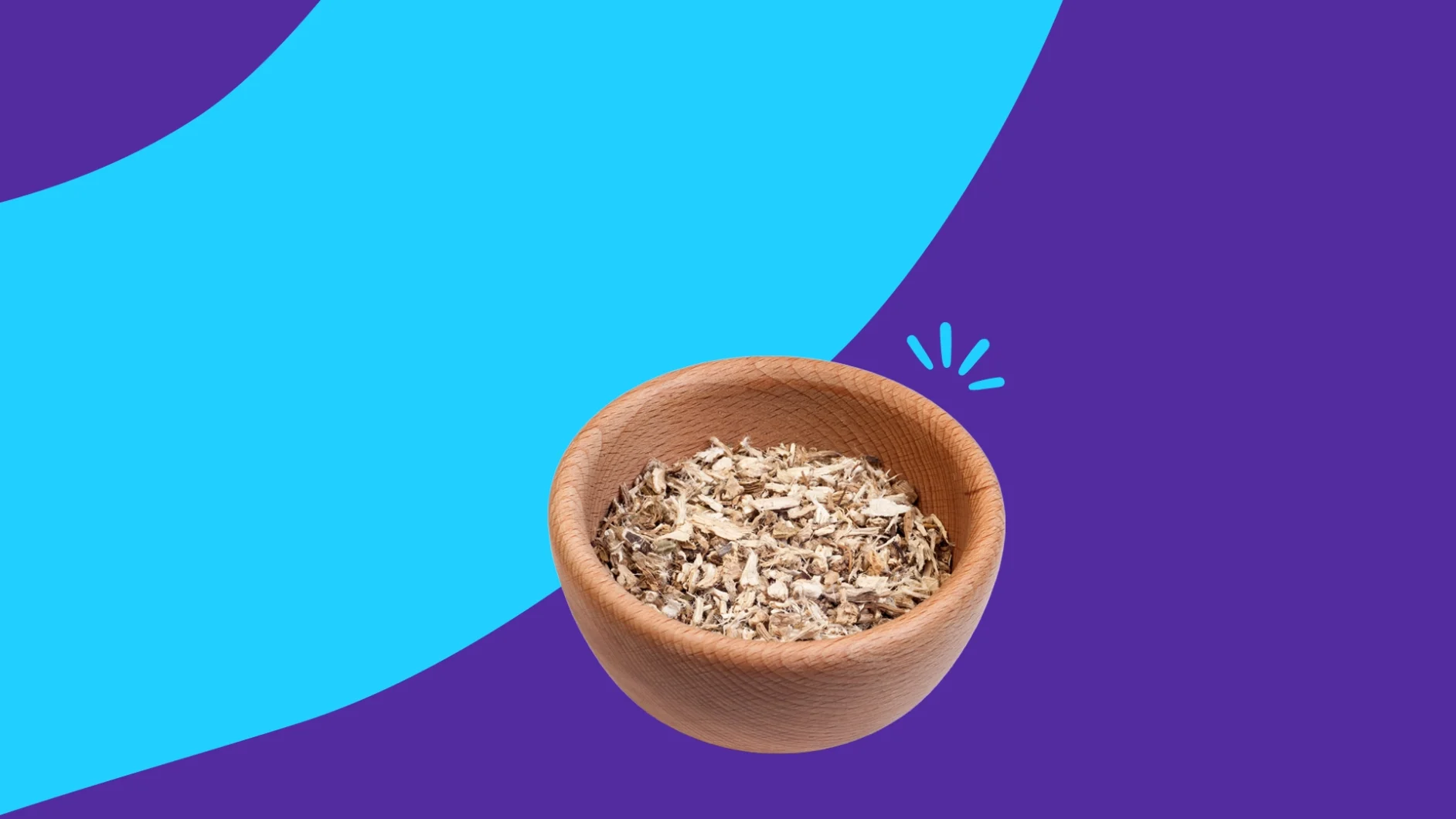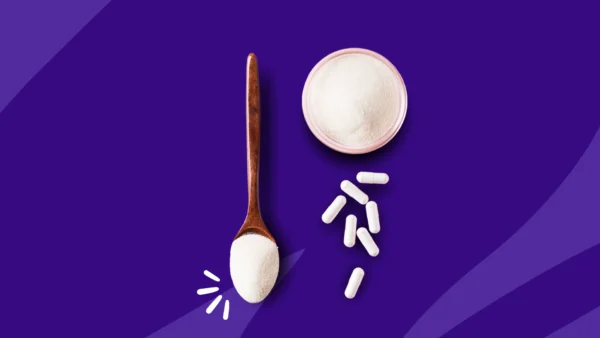Key takeaways
Marshmallow root is the brown, fibrous husk of the marshmallow plant that’s been used for centuries as an herbal remedy.
It has potential benefits such as treating cough, preventing stomach ulcers, soothing skin irritation, promoting wound healing, and more.
Much of the research on its efficacy is animal studies, so talk to your provider before trying this supplement.
Marshmallow isn’t just a squishy confectionary. It also refers to a type of medicinal plant that’s been used for centuries. Marshmallow root (Althaea officinalis) is the brown, fibrous husk of the marshmallow plant that’s been used for centuries as an herbal remedy. The marshmallow plant is native to Europe, North Africa, and Western Asia, and its medicinal use dates back to the Ancient Egyptians. It’s long been touted as an herbal cure for a dry cough, but today, the benefits of marshmallow root are also harnessed to soothe symptoms of the skin, respiratory system, digestive tract, and more.
If the name sounds familiar, that’s because marshmallow root is used in traditional recipes for marshmallow candies. While most store-bought marshmallows no longer contain the beneficial plant, marshmallow root teas, supplements, tinctures, and ointments are still widely used thanks to their potential health benefits.
9 health benefits of marshmallow root
Many of the health benefits of marshmallow root can be attributed to its antioxidant and anti-inflammatory properties as a demulcent herb, which means it forms a protective layer over the mucous membranes. “The roots of the marshmallow plant contain significant mucilage, which is slimy and thick,” explains Jenna Volpe, RDN, LD, a registered dietitian practicing in Austin, Texas. This high mucilage content is largely responsible for marshmallow root’s ability to soothe coughs and even coat the digestive and respiratory tracts.
While the health benefits of marshmallow root are mainly associated with respiratory and gut health, there are more medicinal uses of marshmallow root to know. Here are some of the research-backed ways it can support your health.
1. Soothes the mucous membranes
Mucous membranes span from your head to your torso—and marshmallow root can help soothe them. The soft tissues that line some of your organs and cavities, such as the mouth and digestive tract, are prone to dryness and irritation. This can lead to symptoms like dry cough, sore throat, and digestive issues.
“Research is beginning to uncover what our ancestors have known for centuries about marshmallow root—the demulcent constituents are soothing for the mucous membranes of the body,” Volpe says, adding that these health benefits mainly target the lungs and gut.
When it comes into contact with water, the mucilage found in marshmallow root forms a slick substance that coats the mucous membranes and can relieve irritation, according to Mount Sinai.
2. Treats cough
The next time you’re sick or have bronchitis, you might want to reach for cough syrups and lozenges that contain marshmallow root. Though much of the research consists of animal studies, marshmallow root is proven to treat dry coughs, says Inna Melamed, Pharm.D., a functional medical practitioner in Manalapan, New Jersey. Further studies found marshmallow root medicines as or more effective than a nonsteroidal anti-inflammatory drug—with its antioxidant and anti-inflammatory properties, it effectively treats dry cough.
However, this is hardly surprising since ancient civilizations have been using this medicinal plant to treat coughs for thousands of years. “Marshmallow root is a mucilaginous herb,” Dr. Melamed explains. “It lessens coughing by forming a protective layer on the mucosal lining of the respiratory tract.” This protective coating may also help soothe a sore throat.
3. Protects against stomach ulcers
Since it coats the mucous membranes, marshmallow root may have gut health benefits, too, Volpe says. Specifically, it’s known for protecting against stomach ulcers, as evidenced by some animal studies. “Researchers have found that mucilage and flavonoids from marshmallow root may form a protective layer over the gastric mucosa, protecting against stomach ulceration,” Dr. Melamed says. Further animal studies came to similar conclusions—marshmallow root offers protection against peptic ulcers, which occur along the lining of the stomach, thanks to its antioxidant properties.
4. Soothes skin irritation
If you’ve ever come across marshmallow root salves, ointments, balms, or creams, there’s a good reason. Marshmallow root extract has found its way into topical skincare products because of its purported skin health benefits, which are largely linked to its antioxidant content, Volpe suggests.
According to a 2021 clinical trial, a topical cream containing 1% marshmallow root was found to be more effective than 1% hydrocortisone cream in the treatment of atopic dermatitis (aka eczema) in children. Given its anti-inflammatory properties, it’s no surprise that marshmallow root may reduce inflammation and irritation in other inflammatory skin diseases. In addition to eczema, marshmallow root ointments have been shown to reduce skin irritation and treat mild folliculitis (inflammation of a hair follicle).
5. Improves leaky gut
Leaky gut syndrome isn’t formally recognized as a medical diagnosis, but it’s associated with gas, bloating, and indigestion, according to the Cleveland Clinic. The mucous lining of the intestines is semi-permeable, and some people’s linings let through more than they’re supposed to, causing uncomfortable gastrointestinal symptoms. Some research suggests that yogurt formulated with marshmallow root may help treat leaky gut.
6. Promotes wound healing
Antibiotic ointments are the go-to treatments to prevent wounds from becoming infected, but antibiotic resistance is a growing problem worldwide. Researchers are beginning to explore the possible wound-healing benefits of herbal medicines like marshmallow root, and the outlook is promising. In some animal studies, topical marshmallow root has been shown to kill bacteria in a way that resembles antibiotics and accelerates the wound-healing process.
7. May have anticancer properties
While the demulcent effects of marshmallow root help soothe inflamed mucous membranes, the antioxidants in the medicinal plant better explain some of its topical and anticancer uses.
“The verdict of a 2016 study is that marshmallow root’s antioxidants made it significantly more effective than astragalus root at protecting cells from oxidative damage induced by UVA rays,” Volpe explains. Reducing oxidative stress from ultraviolet light could reduce the risk for the most common type of cancer in the United States: skin cancer. Along with routine sunscreen use, antioxidant-rich skincare ingredients like marshmallow root could support skin health and prevent cancer-causing skin damage.
What’s more, researchers have begun looking into the potential anticancer health benefits of marshmallow root. It may help prevent or reduce the growth of liver tumors, according to a 2023 study.
8. Provides prebiotics to the gut
Everyone has an ecosystem of microbes that live in their gut, known as the gut microbiome. Some microbes are helpful, such as probiotics, while others are harmful. Probiotics are known for supporting healthy gut function, and marshmallow root may be a tool to provide a food source known as prebiotics to probiotics in the gut, Volpe says. “As a demulcent herb, marshmallow root is naturally rich in polysaccharide constituents,” she explains. “Specifically, it’s high in L-rhamnose, a bacteria with prebiotic activity.”
9. Supports the urinary tract
Marshmallow root has antibacterial properties, which may help fight infections throughout the body. Namely, marshmallow root has been shown to inhibit bacteria in the urinary tract—keeping the bladder clean, soothing bladder inflammation, and stopping urinary bleeding. It’s also a recommended herbal treatment for painful bladder syndrome and pelvic pain, and it may possess diuretic properties.
Marshmallow root side effects
Whether taken orally or applied topically, it’s important to be mindful of any side effects associated with using supplements, including marshmallow root. However, the use of marshmallow root is generally considered safe and not associated with many side effects, Dr. Melamed says.
According to Volpe, many of the side effects of marshmallow root involve the digestive tract. “Marshmallow root can worsen symptoms such as gas, bloating, and diarrhea,” she says, adding that this is especially true for people with small intestinal bacterial overgrowth (SIBO).
Since much of the scientific research on marshmallow root involves animal studies, there aren’t any clear guidelines surrounding the safety of marshmallow root supplements and products. While it appears safe for pregnant and breastfeeding women, you should check with your healthcare provider before taking any new herbal supplement or medicinal plants.
Does marshmallow root interfere with medications?
Since marshmallow root coats the lining of the stomach, it can interfere with the absorption of some medications, such as lithium and some blood sugar medications.
“There are minor interactions with antiplatelet drugs, which could increase the risk of bleeding,” Dr. Melamed explains. “It’s also not recommended to use marshmallow root prior to surgery.”
To reduce any interactions between marshmallow root and other medications, Volpe recommends spacing them out. “People should take marshmallow root at least an hour apart from any and all medications,” she says. “Otherwise, the thick, demulcent constituents could potentially reduce the absorption and effectiveness of the medication.”
Bottom line: Marshmallow root is a versatile supplement
Marshmallow root is a versatile and powerful supplement. You can drink it in tea, take oral capsules, or apply it topically. Ultimately, it’s still a supplement and should be treated as such. There’s no standard dose for marshmallow root, Volpe says, adding that while it’s generally safe for most people to take regularly, it’s best to check with your healthcare provider before starting a new supplement regimen.
Sources
- Marshmallow, Mount Sinai
- Marsh mallow (althaea officinalis l.) and its potency in the treatment of cough, Complementary Medicine Research (2020)
- Anti-inflammatory and anti-oxidative effects of phytohustil and root extract of althaea officinalis l. on macrophages in vitro, Frontiers in Pharmacology (2020)
- Gastro-protective and anti-oxidant potential of althaea officinalis and solanum nigrum on pyloric ligation/indomethacin-induced ulceration in rats, Antioxidants (2019)
- Protective effects of ginger and marshmallow extracts on indomethacin-induced peptic ulcer in rats, Journal of Natural Science, Biology, and Medicine (2015)
- Leaky gut syndrome, Cleveland Clinic (2022)
- Attributes of culture bacteria as influenced by ingredients that help treat leaky gut, Microorganisms (2023)
- Evaluation of the antibacterial activity of the althaea officinalis L. leaf extract and its wound healing potency in the rat model of excision wound creation, Avicenna Journal of Phytomedicine (2015)
- Effect of topical marshmallow (Althaea officinalis) on atopic dermatitis in children: A pilot double-blind active-controlled clinical trial of an in-silico-analyzed phytomedicine, Phytotherapy Research (2021)
- Medicinal plants used in treatment of inflammatory skin diseases, Advances in Dermatology and Allergology (2013)
- Protective effects of Althaea officinalis L. extract against N‐diethylnitrosamine‐induced hepatocellular carcinoma in male Wistar rats through antioxidative, anti‐inflammatory, mitochondrial apoptosis and PI3K/Akt/mTOR signaling pathways, Food Science & Nutrition (2023)
- An evaluation of root phytochemicals derived from althea officinalis (marshmallow) and astragalus membranaceus as potential natural components of uv protecting dermatological formulations, Oxidative Medicine and Cellular Longevity (2016)
- Skin cancer, American Academy of Dermatology (2022)
- In vitro antibacterial activities of selected medicinal plants used by traditional healers for treating urinary tract infection in haramaya district, eastern Ethiopia, Infection and Drug Resistance (2023)
- Recommendations to the primary care practitioners and the patients for managing pelvic pain, especially in painful bladder syndrome for early and better prognosis, Journal of Exercise Rehabilitation (2015)











